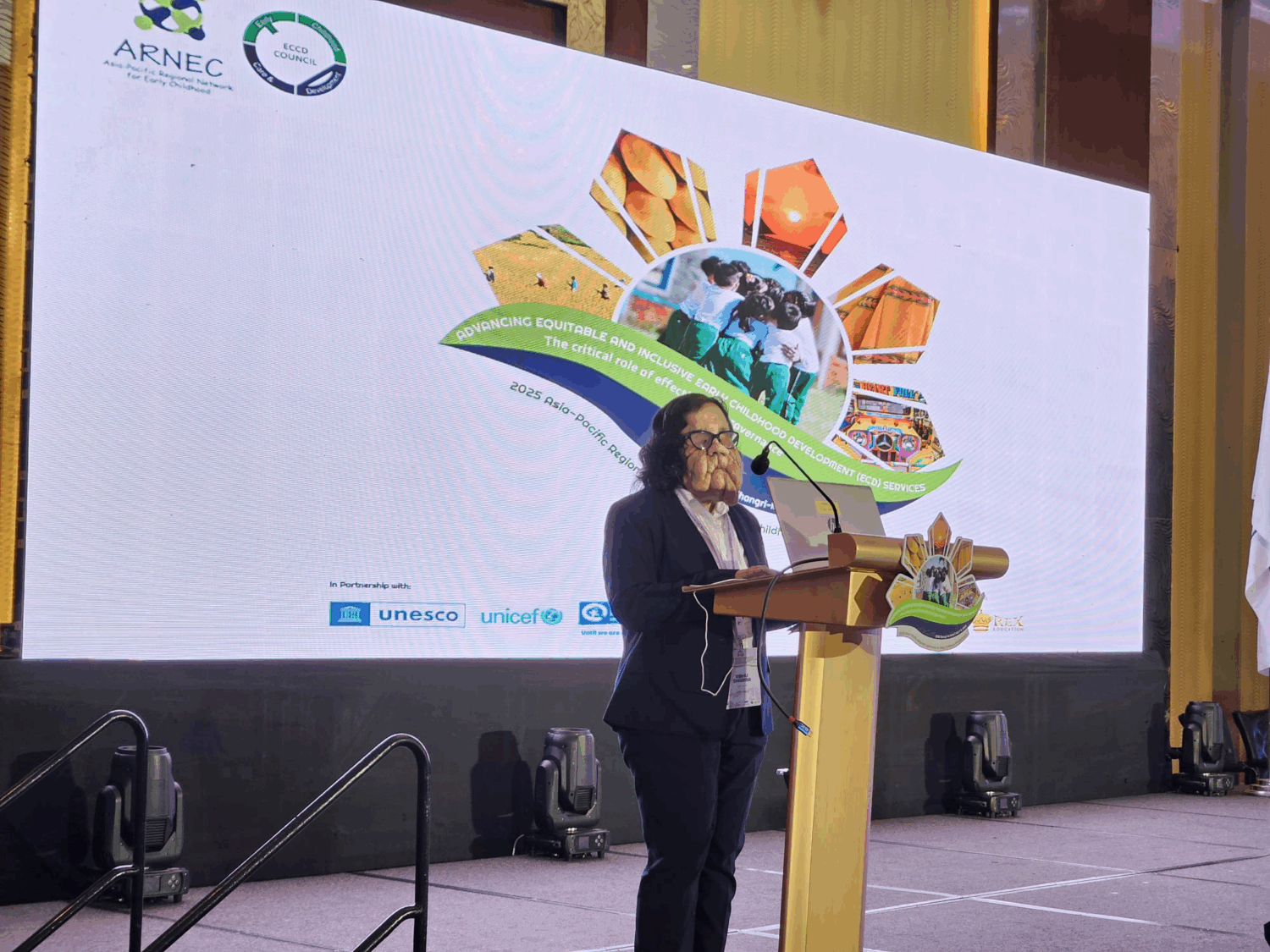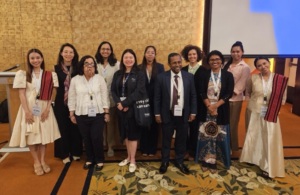Why inclusion must begin in the earliest years

Vibhu Sharma, Theirworld’s Disability and Inclusion Consultant, represented the Act For Early Years campaign at a major early childhood conference in Manila. Here she gives her thoughts on the event.
Earlier this month, I had the opportunity to attend and contribute to the 2025 conference of the Asia-Pacific Regional Network for Early Childhood (ARNEC) in Manila, Philippines.
Titled Advancing equitable and inclusive early childhood development services: The critical role of effective local governance, the conference brought together nearly 500 stakeholders from across the region and the world to advance inclusive early childhood development (ECD).
It was both an honour and a deeply meaningful experience to represent Theirworld and the Act For Early Years campaign at the conference. Over three days of dialogue and learning, one message stood out: if we are serious about building inclusive societies, then we must start at the very beginning.
Inclusion from the start: reflections from my keynote address
One of the highlights of the conference for me was delivering a keynote address at a plenary session titled Embedding disability inclusion in early childhood development: Why it matters and how we get their insights from global practice and lived experience.
I drew on both lived experience and global practice to stress why inclusive early years systems are not just a moral imperative but a smart investment in equity and social justice. I shared my own story to illustrate the impact of systems that were never designed for inclusion – a story that, 25 years later, continues to mirror the realities of many children with disabilities today.
Yet I also spoke about what becomes possible when we choose to act differently. The response in the room was encouraging and energising. It sparked conversations around shifting systems – not children – which I believe captured the spirit of the entire conference.
As I emphasised, the children who stand at the margins of our health, education and social protection systems today are the ones we must urgently reach. The Act For Early Years campaign, launched by Theirworld, calls for bold investments – including $1 billion in new funding – to ensure every child, including children with disabilities, gets the best start in life and has access to the care, support and stimulation they need to thrive.
Elevating evidence: a disability-inclusive ECD panel
Another key moment was sharing findings from Theirworld’s new paper All Means All: A Call for Disability-Inclusive Early Years Financing during a panel on From Policy to Practice: Advancing Disability-Inclusive Early Childhood. The paper outlines urgent steps governments and donors must take to embed disability inclusion in ECD financing and programming.
In my remarks, I highlighted the stark inequalities children with disabilities face in the early years – from reduced access to preschool and early learning to higher malnutrition and health disparities, particularly in low-income and rural settings.
The panel reaffirmed the need to move from intention to action. I called for a twin-track approach: investing in inclusive systems while also supporting disability-specific services like early screening, assistive technologies and caregiver support. Families and organisations of persons with disabilities (OPDs) must be empowered as co-creators of these services.
The message resonated widely: disability inclusion must be a core priority, not an afterthought, in early years planning – and it must be backed by data, funding and accountability.

Vibhu Sharma with other participants at the 2025 Asia-Pacific Regional Network for Early Childhood conference in Manila
Key takeaways from ARNEC 2025
The conference also brought forward key cross-cutting lessons for inclusive early childhood systems:
- Local governance matters. Community-based centres, faith-based partners and inclusive budgeting all showed how local leadership can turn policies into practice.
- Parents as experts. Support for caregivers – especially of children with disabilities – must recognise them not as recipients but as leaders in early childhood systems.
- Data drives equity. Disaggregated data by disability, gender, language and geography is essential to inform equitable planning and resource allocation.
- Early years as an equity lever. From climate resilience to school readiness, the early years were positioned not just as a service domain but as a foundation for justice and opportunity.
Reflections and looking ahead
What stood out throughout ARNEC was the intentionality behind the dialogue and the shared willingness to listen, learn and act. The sessions were rich, ranging from inclusive play and parenting support to equitable financing and climate-responsive early years systems.
It was especially heartening to see lived experience not treated as anecdotal but recognised as vital evidence. Whether from parent advocates, educators or persons with disabilities themselves, these stories offered insight that was as strategic as it was human, and these voices added power and perspective to the dialogue.
And yet it was also a reminder that disability inclusion needs more attention in mainstream ECD discourse. Not just in dedicated sessions, but as a throughline in early years planning. Inclusion cannot be incidental. It must be intentional.
It’s not simply a technical fix. It’s a values-based decision – one that must be made again and again, across sectors, budgets and policies. And we can’t afford to postpone it.
I returned from ARNEC with a renewed sense of purpose. It was a privilege to be part of a space that was shaped so intentionally around inclusion and to see that disability was not an isolated theme but integrated across multiple conversations.
The success of the All Means All paper launch and the #ActForEarlyYears campaign at ARNEC is a reminder of what’s possible when we act with evidence and in partnership.
Because inclusion doesn’t just begin in the early years. It begins with how we choose to show up and what we choose to build – together.

